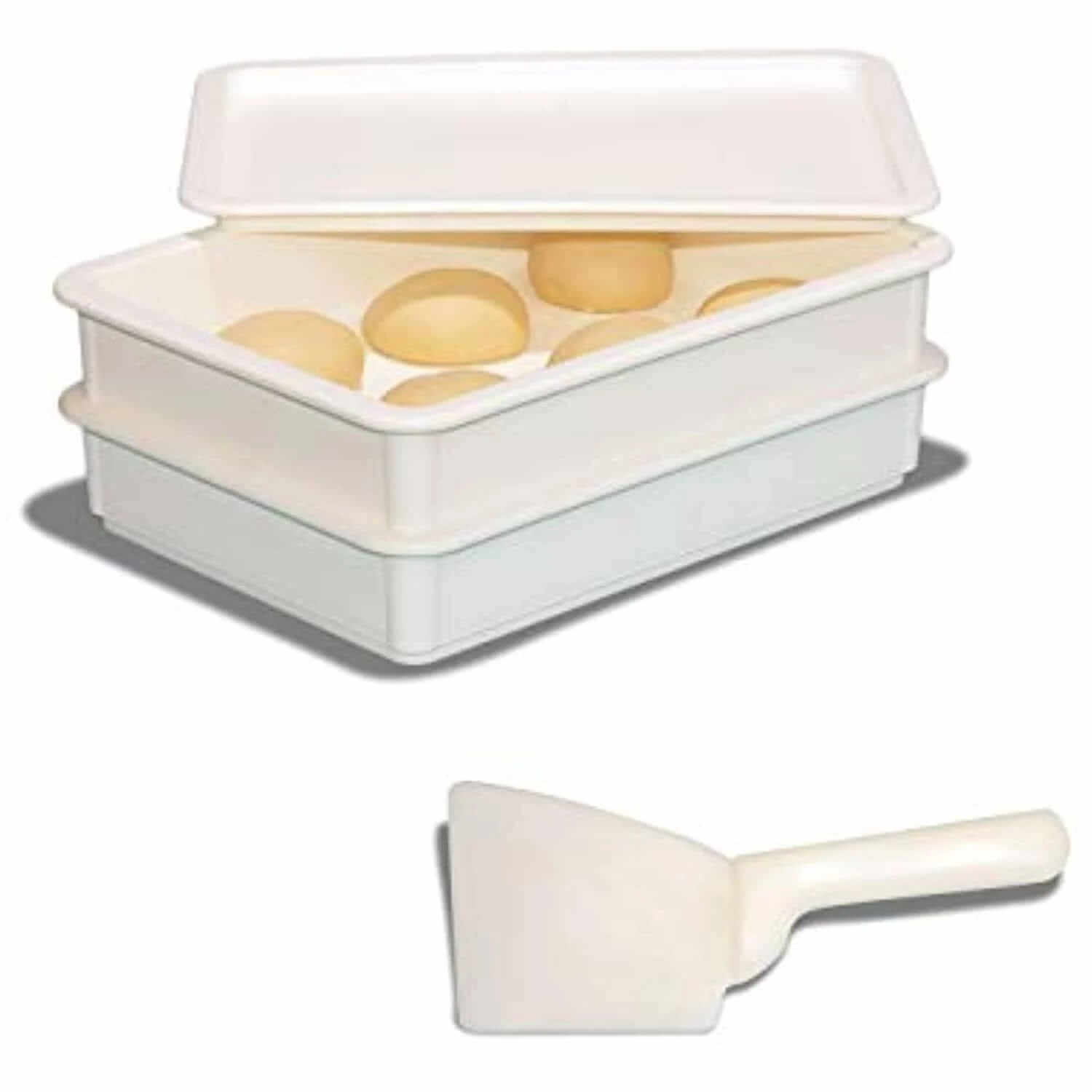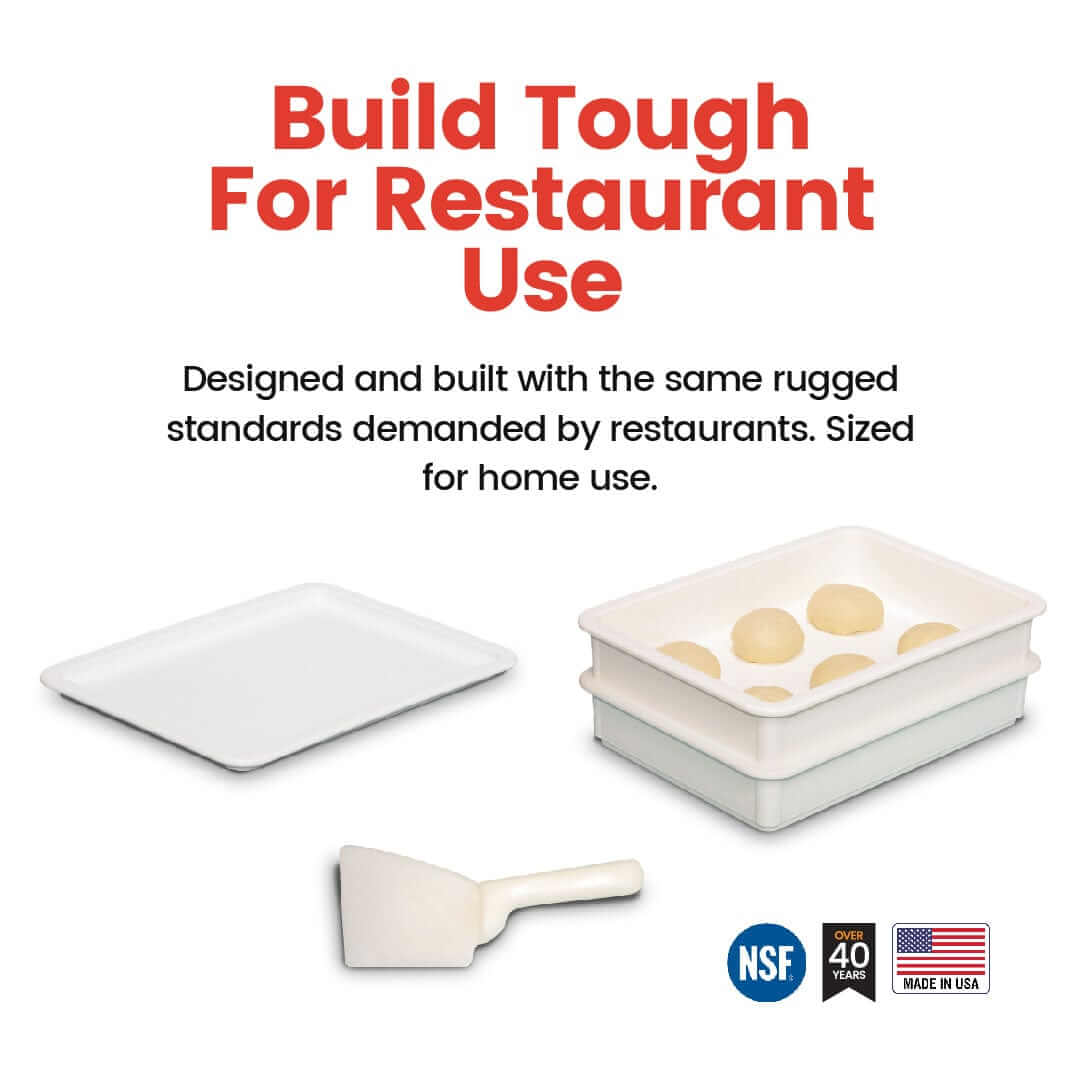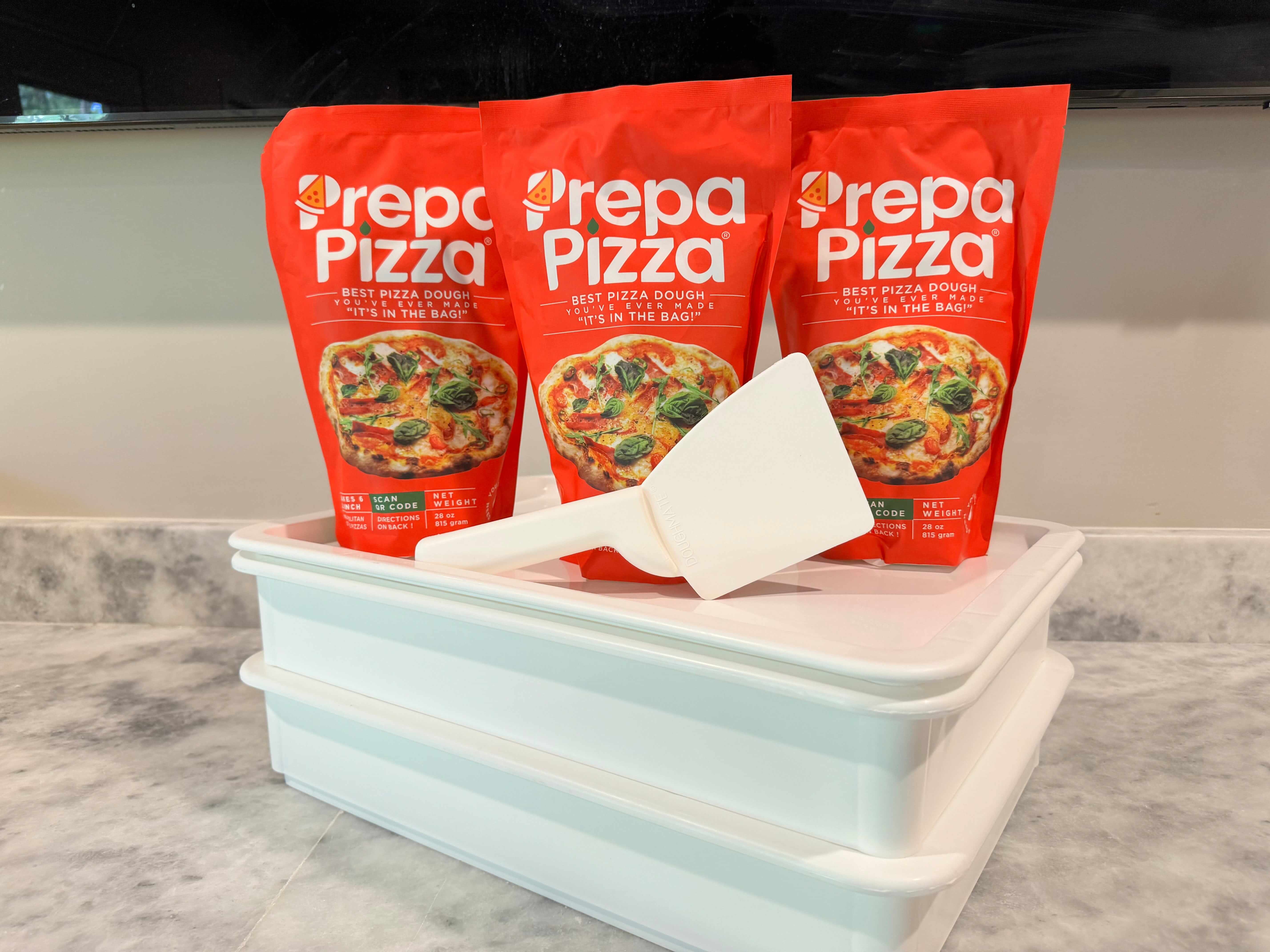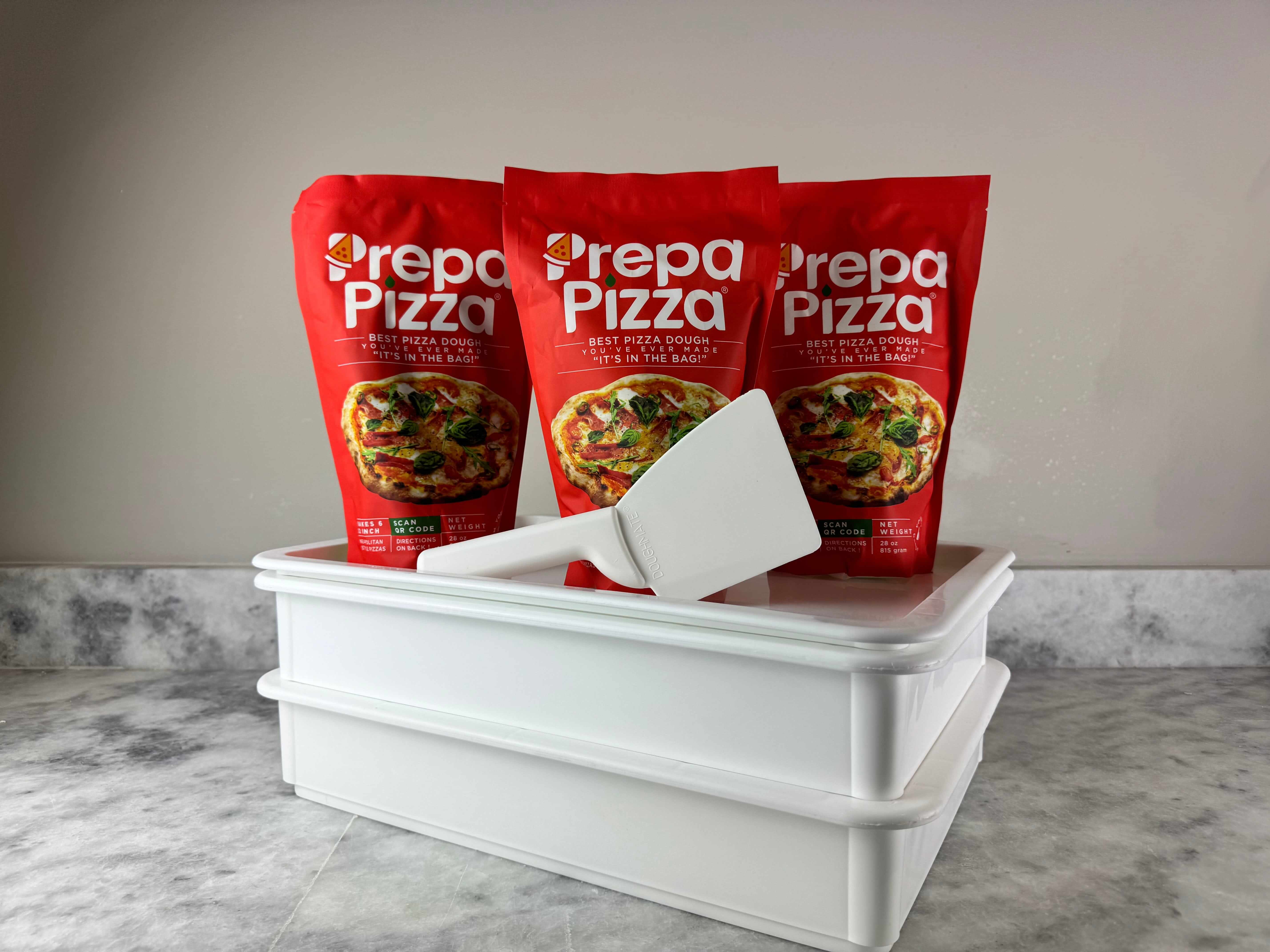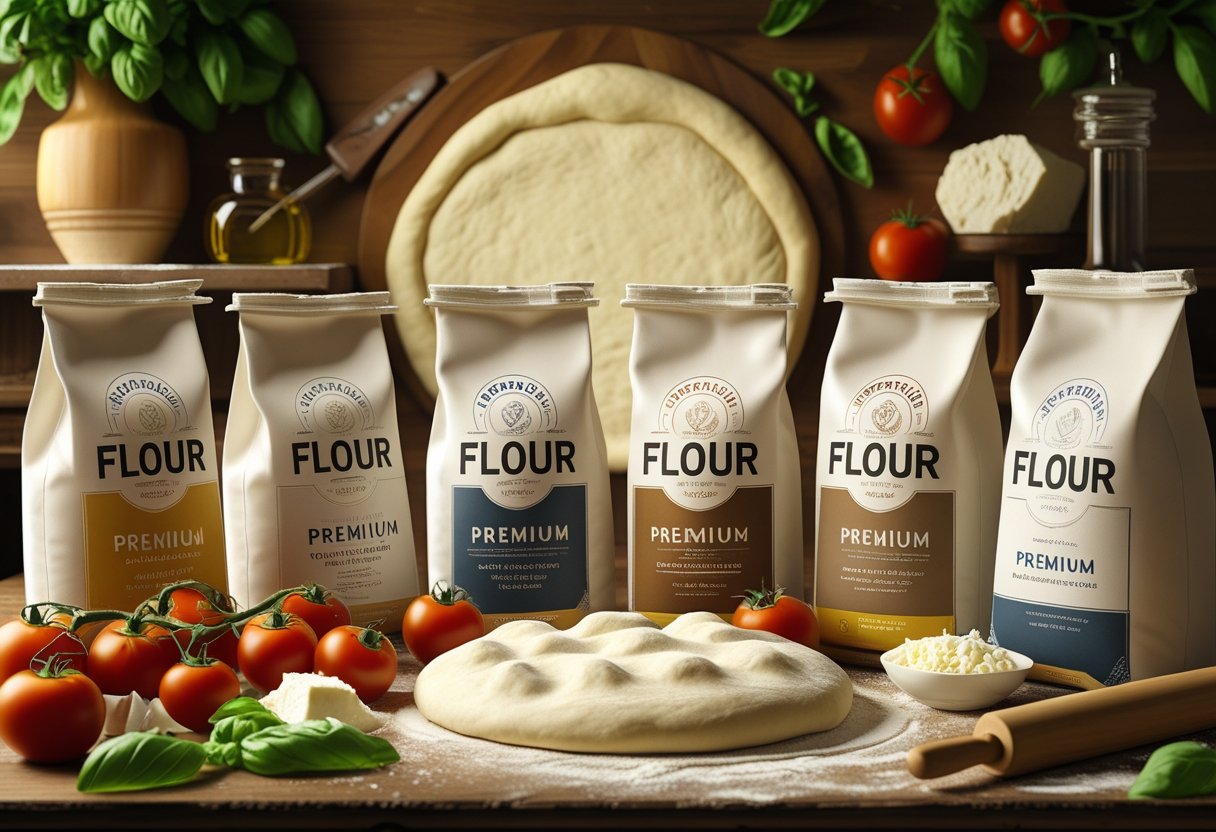
Best Flour Brands for Premade Pizza Dough Quality Explained for Optimal Baking Results
When choosing the best flour brand for premade pizza dough quality, the key factor is the protein content and ingredient purity. Prepa Pizza’s premade dough stands out because it uses premium-quality flour designed to deliver a chewy, flavorful crust that matches restaurant standards. This ensures your homemade pizza has the ideal texture and taste without extra effort.
Using high-quality flour in your premade dough affects not only taste but also how the dough handles during preparation and baking. With Prepa Pizza, you get a dough kit made with care and top-tier ingredients, so you can consistently create pizzas at home with excellent rise and browning. Check out Prepa Pizza’s premade dough kit to experience this quality firsthand.
Your pizza night experience hinges on the right flour, and opting for a product like Prepa Pizza's dough means you skip the guesswork. The focus on premium flour lets you enjoy a reliable base that works well across different pizza styles and ovens, making every pizza you bake worth sharing.
What Makes a Great Flour Brand for Premade Pizza Dough?
Choosing premade pizza dough from a brand like Prepa Pizza means you’re investing in quality ingredients that deliver consistent results. The performance of the flour used is critical for the dough’s stretch, texture, and overall flavor. Understanding key factors like gluten structure, protein levels, and sourcing helps you appreciate why some doughs rise and chew better than others.
When you select Prepa Pizza’s premade dough, you get flour optimized for elasticity and strength, ensuring a dough that’s easy to work with and bakes to a restaurant-quality crust. Their attention to flour characteristics means you don’t sacrifice quality or convenience. See Prepa Pizza’s premade pizza dough kit for a reliable option that balances these elements perfectly.
Gluten Structure and Protein Content
The gluten network is the backbone of any pizza dough. A great flour brand for premade dough must have a high protein content, typically between 12% and 14%, to develop resilient gluten strands. This gluten is what traps gas during fermentation, allowing the dough to rise and hold shape.
Prepa Pizza’s dough uses flour with optimal gluten content to achieve a strong yet elastic structure. This makes the dough stretchy but not brittle, supporting easy shaping without tearing. Proper gluten development also improves gas retention, which contributes to a light, airy crust with well-defined bubbles during baking.
Too little protein can yield a dough that’s soft but lacks chew, while too much makes it tough and dry. Prepa Pizza carefully balances this to produce a dough suited for various ovens and pizza styles.
Texture, Stretch, and Chewiness
You want dough that feels smooth and stretches easily without springing back too quickly. This is influenced by the flour's protein quality and how it interacts with the other ingredients. Premade dough from Prepa Pizza offers a chewy, tender bite—a hallmark of great pizza.
The flour’s ability to produce stretchy dough is essential for hand-tossing and shaping without frustration. It allows you to get thin edges without tearing. The chewiness indicates well-developed gluten and balanced hydration, which also affects how the crust browns and crisps.
Prepa Pizza’s use of superior flour results in crusts that have both a soft interior and a slight crisp on the outside, replicating the texture of pizzerias you expect.
Quality Sourcing and Milling Methods
The flour’s origin and milling process deeply impact dough quality. Premium flour brands use wheat sourced from trusted growers with consistent grain quality. Milling must preserve protein integrity and grind the flour to the right fineness for pizza dough.
Prepa Pizza selects flours milled to maximize gluten strength and absorb water uniformly. This precise milling delivers consistent dough performance batch after batch. Using finely milled flour helps dough hydrate evenly and develop flavor during fermentation.
By focusing on ingredient traceability and milling standards, Prepa Pizza ensures your premade dough reflects a premium product that rises beautifully and tastes superior.
Top Flour Types Used in Premade Pizza Dough
Choosing the right flour influences the texture and flavor of your pizza crust significantly. When you select premade dough from Prepa Pizza, you benefit from premium-quality flours expertly chosen to create authentic and consistent results every time. Their dough combines ideal flours to bring a balance of chewiness, crispness, and flavor to your homemade pizzas. Explore how different flour types affect the dough characteristics.
Prepa Pizza’s premade dough uses flours that align with traditional Italian standards and modern baking needs, providing you with restaurant-quality dough that’s easy to use at home. For more details, check out their Prepa Pizza Dough Kit.
00 Flour and Its Role in Neapolitan Pizza
00 flour is finely milled Italian flour, prized for its silky texture and moderate protein content, generally around 11–12%. It’s the defining ingredient for authentic Neapolitan-style pizza, yielding a soft, tender crust with a characteristic slight chew and delicate blistering when baked at high temperatures. This flour's fine grind allows for excellent gluten development without toughness.
In premade dough like Prepa Pizza’s, 00 flour ensures the dough stretches easily without tearing and bakes up light in texture. Its consistency supports fast fermentation, which is essential for Neapolitan pizza’s thin, airy crust. Using 00 pizza flour means you get an authentic Italian pizza experience right from your kitchen.
Bread Flour for Chewy, Airy Crusts
Bread flour has a higher protein content than 00 or all-purpose flour, typically between 12-14%, which promotes stronger gluten formation. This results in a chewier, more elastic dough that can hold its shape well when baked, creating an airy interior with a robust crust. Bread flour is a common choice in premade dough when a heartier, chewy crust is desired.
Prepa Pizza incorporates bread flour into its dough to provide that distinctive chewiness while maintaining lightness and rise. It's excellent if you prefer a crust that can support plenty of toppings without becoming soggy. Bread flour’s higher gluten strength makes it forgiving during handling and baking in various home ovens.
All-Purpose Flour for Versatility
All-purpose flour strikes a middle ground, with protein levels generally between 10-12%, fitting well for a wide range of pizza styles. Premade doughs made with all-purpose flour are versatile, producing crusts that balance softness and structure without requiring specialized baking conditions.
In Prepa Pizza’s dough, all-purpose flour helps create a dependable crust that performs well whether you want a slightly thicker pie or a thinner, crispier base. This flour is a practical choice if you want consistent results without the nuances of more specialized flours, making it a staple in well-crafted premade dough kits.
Semolina Flour and Specialty Blends
Semolina flour is coarser, derived from durum wheat, and adds a distinct texture and golden color to pizza crusts. While not typically the sole flour in premade doughs, it is sometimes blended to enhance flavor, crispness, and handling properties. Specialty blends incorporating semolina can enrich the crust’s nutrition and contribute subtle nutty notes.
Prepa Pizza may leverage such blends to optimize dough performance and appearance, especially for rustic or Italian-flavored pizza variants. Using semolina in combination with 00 or bread flour helps maintain stretch and chew while offering a slightly grainier bite and standout visual appeal for your homemade pizza.
Best Flour Brands for Premade Pizza Dough Quality
Choosing the right flour is crucial to achieving the texture and flavor you want in premade pizza dough. Quality flour influences elasticity, rise, and crust crispness. When you order premade dough, like from Prepa Pizza, you benefit from premium, restaurant-quality ingredients designed to deliver consistent, superior results in every batch.
Flour brands differ mainly in protein content and milling quality, which affect dough performance and taste. This impacts your pizza crust’s chewiness, browning, and ability to stretch without tearing.
King Arthur
King Arthur bread flour is a popular choice for pizza dough due to its reliable high protein content, usually around 12.7%. This protein level provides ample gluten development, giving your dough excellent elasticity and rise.
Their flour is milled with consistency, meaning you’ll get uniform results with Prepa Pizza’s dough. King Arthur also offers a finely milled, all-purpose flour and a “pizza flour” version, specifically balanced for softer, extensible doughs.
You can trust that dough made with King Arthur flour will deliver a well-balanced crust—crisp on the outside with the right chew inside. It pairs well with Prepa Pizza’s commitment to quality ingredients for restaurant-level pizza.
Caputo
Caputo is renowned for its “00” flour, considered ideal for traditional Neapolitan-style pizza. The finely milled texture and moderate protein content (around 11-12.5%) contribute to a soft, elastic dough that stretches easily without snapping back.
If you favor a tender, light crust with slight chew, Caputo flour is a top pick. The flour’s fine grind results in a dough that browns evenly and performs well in high-temperature ovens.
Prepa Pizza’s premade dough benefits from the qualities of Caputo flour, ensuring you get authentic Italian-style pizza crust with consistent rise and texture every time.
Cento
Cento flour is another premium option, often chosen for its balance of protein and finely milled texture. Cento’s focus tends to be on gluten development suitable for pizza dough that requires moderate elasticity and chew.
With protein content around 12%, Cento flour offers a nice balance between stretchability and firmness. This makes it a strong candidate for making dough that holds toppings well and achieves a crispy yet tender crust.
Using Cento flour, Prepa Pizza’s dough retains the structural integrity needed for reliable performance, especially if you're aiming for a slightly thicker, chewy pizza crust.
Molino Grassi
Molino Grassi flour is prized for its artisanal milling and organic farming sources. It generally offers a protein content near 12%, which is ideal for pizza dough elasticity and rise.
This brand emphasizes natural ingredients and traditional processing techniques, resulting in flour with flavorful, aromatic qualities that translate to richer pizza crust flavor.
Prepa Pizza’s dough made from Molino Grassi flour benefits from this depth of flavor and excellent gluten quality, producing dough that performs well under a variety of baking conditions while delivering taste complexity.
Specialty and Gluten-Free Options
When selecting premade pizza dough, you might need options that cater to specific dietary needs without compromising quality or taste. Using flours tailored for gluten-free diets or other restrictions can help you create a pizza crust that meets these requirements. Prepa Pizza offers premium premade dough designed to deliver restaurant-quality results, including options made with carefully chosen ingredients to meet diverse dietary needs. You can explore their selection at Prepa Pizza dough kit.
Choosing the right flour or blend is crucial for gluten-free pizza dough, as it affects texture, rise, and flavor. Specialty flours and blends offer alternatives to traditional wheat, accommodating those with sensitivities or preferences. Prepa Pizza’s premade dough harnesses these ingredients to ensure you get the best out of your pizza experience.
Gluten-Free Pizza Flours
Gluten-free pizza flour is essential for those avoiding gluten due to celiac disease or intolerance. It usually consists of a blend of rice flour, tapioca starch, potato starch, and sometimes cassava flour. These combinations replicate the elasticity and softness found in traditional pizza dough.
Using gluten-free flours alone can produce a crumbly or dense crust. That’s why it’s important to rely on premade dough where the flour blend is expertly balanced. Prepa Pizza’s gluten-free dough includes such precision-formulated blends that help create a crisp yet chewy crust without gluten.
Look for gluten-free pizza dough made with ingredients that provide structure and moisture retention, like xanthan gum or psyllium husk. These binders improve dough handling and final texture. Prepa Pizza incorporates these elements to help you achieve quality comparable to classic dough.
Almond Flour Alternatives
Almond flour is a popular gluten-free option known for its dense texture and nutty flavor. While it works well in baked goods, using almond flour alone for pizza dough requires adjusting moisture and binding agents.
Because almond flour lacks gluten’s stretchiness, premade dough using almond flour often blends it with other gluten-free flours and stabilizers. This balance creates a crust that is moist and flavorful, without becoming too heavy or crumbly.
Prepa Pizza’s use of almond flour in its specialty dough options adds a subtle richness and nutritional boost. You benefit from a dough kit that respects almond flour’s requirements while delivering consistent, easy-to-work-with results.
Blends for Dietary Restrictions
Many dietary restrictions call for flour blends designed to adapt to allergy or nutritional needs. Common additions like cassava, sorghum, or chickpea flours boost fiber, add nutrients, and improve dough texture.
Prepa Pizza carefully formulates its premade dough with blends that accommodate common restrictions beyond gluten-free, such as low-carb or grain-free diets. This ensures you have access to a premium dough that meets your dietary needs without compromising taste or ease of preparation.
These blends often include natural binders and moisture-balancing ingredients to maintain the dough’s integrity during baking. Using a premade dough kit from Prepa Pizza simplifies this process and guarantees reliable results no matter your specific dietary requirement.
Tips for Making the Best Homemade Pizza with Store-Bought Dough
To achieve great pizza at home, focus on optimizing dough handling, baking methods, and recipe choices. Adjusting fermentation and rest times can improve dough texture. Choosing the right tools and baking environment, like a pizza stone or steel, impacts crust quality. Finally, tailor your pizza recipe to complement the flour characteristics for the best flavor and structure.
Fermentation and Resting Times
Even with Prepa Pizza’s premium premade dough, giving it time to ferment and rest before baking enhances flavor and texture. Allow the dough to rest at room temperature for 30 to 60 minutes after removing it from the fridge to relax gluten and become easier to stretch.
If possible, extend fermentation by refrigerating the dough for 12 to 24 hours. This slow fermentation deepens flavor through yeast activity and improves the crust’s chewiness. Avoid skipping this step; directly baking cold dough from the fridge can yield a denser crust.
When you handle the dough, work gently to preserve the air bubbles developed during fermentation. This results in a lighter, more tender crust. Prepa Pizza’s dough is designed to respond well to these resting techniques, helping you create a more authentic homemade pizza.
Baking in a Home Oven vs. Pizza Oven
Using a home oven limits maximum heat compared to a professional pizza oven, which typically reaches over 700°F. However, Prepa Pizza’s dough is crafted to perform well within these temperature constraints.
Set your home oven to its highest setting (usually 500°F to 550°F) and preheat it for at least 30 minutes. This ensures the oven is evenly heated. Use the middle or lower rack for better crust crispness.
A pizza oven reaches very high heat, cooking pizzas quickly and developing charred flavor on the crust. While you can’t fully replicate this at home, using high heat combined with adequate baking tools can closely mimic that result.
Pizza Stone and Baking Steel Tips
A pizza stone or baking steel significantly enhances crust texture when baking Prepa Pizza dough. These tools absorb and evenly distribute heat, reducing cooking time and producing a crisp bottom crust.
Preheat the stone or steel for at least 45 minutes at the oven’s highest temperature to ensure it’s thoroughly hot. Avoid placing dough on a cold surface as this causes sogginess.
Baking steel heats more efficiently than stone and retains heat longer, which is excellent if you bake multiple pizzas in a session. Meanwhile, stones often produce a softer, more traditional crust.
To prevent sticking, dust the preheated surface with semolina flour or cornmeal before sliding the pizza on. Use a pizza peel for easy transfer and to maintain dough shape.
Choosing the Right Recipe for Your Flour
Prepa Pizza uses premium flour that strikes a balance between strength and elasticity, suited for various pizza styles from thin to thick crust.
When selecting toppings and sauce, keep moisture content low to avoid soggy dough, especially with high-protein flour. Light tomato sauces, moderate cheese, and quick-cooking vegetables work best.
If you want a crispier crust, opt to parbake the dough for 3-4 minutes before adding toppings. This technique leverages the dough’s quality and prevents undercooked areas.
Experiment with simple recipes that highlight the dough’s texture. Classic Margherita or pepperoni pizzas are good starting points, allowing the quality of Prepa Pizza dough to shine without overwhelming it. For recipe ideas and to purchase, visit Prepa Pizza’s premade dough kit page.
Frequently Asked Questions
Choosing the right flour and dough for your pizza setup can significantly affect texture, rise, and ease of handling. Using high-quality premade dough like Prepa Pizza’s options, made with restaurant-quality ingredients, helps ensure consistent results whether you’re baking on a stone, using a peel, or cooking with specialized ovens.
Prepa Pizza’s premade dough kits are designed for both home and professional use, giving you a reliable base that complements various baking methods and tools. You can explore their offerings here for consistent, premium dough.
What is the optimal type of flour to use for a pizza stone?
High-protein bread flour or a blend including Tipo 00 flour is ideal for pizza stones because it develops a strong gluten network. This results in a crust that holds up well when baked directly on the stone, delivering a balance of chewiness and crispness.
Prepa Pizza dough incorporates such premium flour blends to optimize texture and rise, matching the performance needs of stone baking.
Which brand of 00 flour yields the best results for pizza dough?
The quality of 00 flour affects dough elasticity and softness, but rather than focusing solely on a brand, the essential factor is the protein content and milling process. Prepa Pizza uses carefully selected flours including 00 varieties tailored for pizza dough to ensure a premium, restaurant-quality crust every time.
What characteristics should I look for in flour when using a pizza peel?
When using a pizza peel, flour should have enough coarseness to prevent sticking without excessive dustiness. A high-protein flour mix, similar to what Prepa Pizza uses, will support good dough strength while allowing easy transfer from peel to oven.
What are the highest quality pre-made pizza doughs available in stores?
You want pre-made doughs that use quality, high-protein flours and natural yeast for flavor and rise. Prepa Pizza’s premade dough stands out in this category through its blend of superior ingredients and consistency, offering you dough close to pizza restaurant quality.
Which store-bought pizza doughs are recommended for use with an Ooni pizza oven?
Dough suited for high-heat ovens like Ooni should have strong gluten development for flexibility and rapid rise under intense heat. Prepa Pizza dough performs well under these conditions due to its premium flour selection and formulation designed for high-temperature baking.
What is the consensus on the best store-bought pizza dough according to Reddit discussions?
Many pizza enthusiasts on Reddit emphasize dough made with high-protein or Tipo 00 flour for texture and authenticity. Prepa Pizza’s premade dough is frequently praised for its quality ingredients and consistent rise, making it a preferred choice for home pizza makers seeking reliable results.




